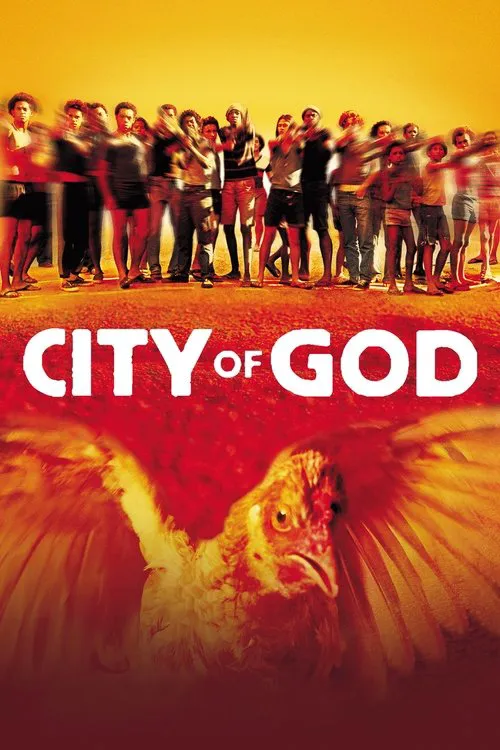City of God

Plot
In the vibrant yet impoverished favelas of Rio de Janeiro, the 1970s set the stage for a tumultuous tale of two young men whose lives would diverge in drastic ways. Set against the backdrop of unrelenting violence and crime, 'City of God' plunges viewers into a gritty universe of struggle and survival. The narrative centers around Buscapé, a young man better known as Rocket, a budding photographer driven by an unbridled passion for capturing the rawest moments of life. Born into the labyrinthine favelas of Ciudad de Deus, Rocket's life is defined by the stringent borders of his neighborhood, which is beset by unimaginable poverty and societal marginalization. Unable to escape the suffocating reality that surrounds him, Rocket finds himself constantly suspended in a web of despair. Maverick and innovative in his vocation as a photographer, Rocket utilises his talents to capture the pulsating rhythm of life in the favelas, particularly the drug-fueled chaos that threatens to consume his community. A victim of circumstance, Rocket documents the increasing violence and desperation as poverty claws its way through the broken lives of the residents. As the film enters into a new phase of Rocket's life, the screen oscillates sharply towards the anti-hero, José "Zé" Pequeno, a volatile drug trafficker veiled in deceit and ruthless determination. The trajectory chosen by Zé illustrates the utter void in governance and protection of Rio's deprived masses. While Rocket aims to document and educate, Zé embarks upon a perilous quest to dominate the supply of cocaine, setting out on a merciless path of violence and destruction. Zé's transformation, marked by a spiraling descent into chaos, embodies the inescapable cycle of vendetta, addiction, and fear. Against this backdrop, a reign of terror emerges as Zé's brutal reign gathers pace, generating fear and submission, breaking the defences that encircle his stronghold in the neighbourhood. This destructive phenomenon not only attracts international attention but also contributes to the despair already plaguing the residents of the favelas. As the consequences of Zé's relentless pursuit roll out across the city, they reach an inevitable climax of inescapable catastrophe. Rocket remains torn between confronting the reality that surrounds him and navigating through the blurring of his relationships with those around him. Pelo's haunting presence, also steeped in despair, deepens Rocket's ambiguity and confusion. Zé's fall is reflected through fragmented lives, shattered egos, and perpetual loss, indicating that paths not taken and precarious chances taken resulted in the rise to his fall from his lofty stronghold of supremacy but Rocket emerges stronger through photography. Rocket's encounters with Zé reveal the unbridgeable gap between the aspirational 'City of God' that the inhabitants once envisioned, and the squalid reality that prevails today. As he forges on in capturing the raw beauty and decay inherent in the landscape of his 'city,' the 'City of God' gains poignancy in conveying a story born from poverty, chaos, and desperation that has ravaged every aspect of a raw cityscape. Sealing the inescapable fate that awaits, 'City of God' captures an aura of human anguish, painting the inexorable and helpless face of human suffering. Behind this fragile façade, lies a deplorable social background where even an individual's moral codes have dissolved.
Reviews
Recommendations




